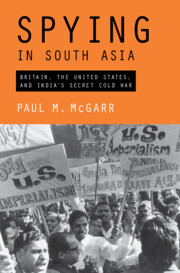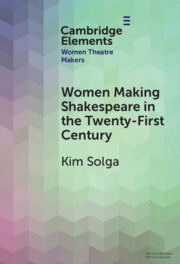401 results
Sustainability dialogues in Brazil: implications for boundary-spanning science and education
-
- Journal:
- Global Sustainability / Volume 7 / 2024
- Published online by Cambridge University Press:
- 20 September 2024, e30
-
- Article
-
- You have access
- Open access
- HTML
- Export citation

Spying in South Asia
- Britain, the United States, and India's Secret Cold War
-
- Published online:
- 12 September 2024
- Print publication:
- 12 September 2024
13 - Decolonizing the Poem
- from Part III - The Poem in the World
-
-
- Book:
- The Cambridge Companion to the Poem
- Published online:
- 30 May 2024
- Print publication:
- 06 June 2024, pp 213-229
-
- Chapter
- Export citation
31 - Two-Spirit Writers and Queer Native American Literature
- from Race and the Politics of Queer and Trans Representation
-
-
- Book:
- The Cambridge History of Queer American Literature
- Published online:
- 17 May 2024
- Print publication:
- 06 June 2024, pp 581-598
-
- Chapter
- Export citation

Women Making Shakespeare in the Twenty-First Century
-
- Published online:
- 05 June 2024
- Print publication:
- 17 October 2024
-
- Element
- Export citation
4 - Imperial Expansion and Restrictive Elections: 1850–1945
-
- Book:
- Colonial Origins of Democracy and Dictatorship
- Published online:
- 08 May 2024
- Print publication:
- 30 May 2024, pp 90-127
-
- Chapter
- Export citation
2 - A Theory of Colonial Electoral Institutions
-
- Book:
- Colonial Origins of Democracy and Dictatorship
- Published online:
- 08 May 2024
- Print publication:
- 30 May 2024, pp 25-49
-
- Chapter
- Export citation
6 - Postcolonial Persistence
-
- Book:
- Colonial Origins of Democracy and Dictatorship
- Published online:
- 08 May 2024
- Print publication:
- 30 May 2024, pp 157-193
-
- Chapter
- Export citation
7 - Conclusion
-
- Book:
- Colonial Origins of Democracy and Dictatorship
- Published online:
- 08 May 2024
- Print publication:
- 30 May 2024, pp 194-206
-
- Chapter
- Export citation
5 - Mass Franchise Expansion after 1945
-
- Book:
- Colonial Origins of Democracy and Dictatorship
- Published online:
- 08 May 2024
- Print publication:
- 30 May 2024, pp 128-156
-
- Chapter
- Export citation
1 - Introduction
-
- Book:
- Colonial Origins of Democracy and Dictatorship
- Published online:
- 08 May 2024
- Print publication:
- 30 May 2024, pp 1-24
-
- Chapter
- Export citation
3 - Representation in Settler Colonies through 1850
-
- Book:
- Colonial Origins of Democracy and Dictatorship
- Published online:
- 08 May 2024
- Print publication:
- 30 May 2024, pp 50-89
-
- Chapter
- Export citation
5 - Generation Q and Decolonizing Alash
-
- Book:
- The Kazakh Spring
- Published online:
- 16 May 2024
- Print publication:
- 23 May 2024, pp 169-193
-
- Chapter
- Export citation
Removing a colonial anachronism - The decolonization of heritage in the 1970s Hong Kong
-
- Journal:
- International Journal of Cultural Property , First View
- Published online by Cambridge University Press:
- 16 May 2024, pp. 1-20
-
- Article
-
- You have access
- Open access
- HTML
- Export citation
Introduction
-
- Book:
- States-in-Waiting
- Published online:
- 09 May 2024
- Print publication:
- 16 May 2024, pp 1-26
-
- Chapter
-
- You have access
- Open access
- HTML
- Export citation
2 - Advocates of Not-Quite Independence
- from Part I - Nationalist Claims-Making
-
- Book:
- States-in-Waiting
- Published online:
- 09 May 2024
- Print publication:
- 16 May 2024, pp 56-82
-
- Chapter
-
- You have access
- Open access
- HTML
- Export citation
4 - The Spectre of Katanga
- from Part II - International Advocacy
-
- Book:
- States-in-Waiting
- Published online:
- 09 May 2024
- Print publication:
- 16 May 2024, pp 116-142
-
- Chapter
-
- You have access
- Open access
- HTML
- Export citation
7 - Postcolonial Imperialism
- from Part III - The Boundaries of Decolonization
-
- Book:
- States-in-Waiting
- Published online:
- 09 May 2024
- Print publication:
- 16 May 2024, pp 203-229
-
- Chapter
-
- You have access
- Open access
- HTML
- Export citation
3 - The Anti-Algiers
- from Part II - International Advocacy
-
- Book:
- States-in-Waiting
- Published online:
- 09 May 2024
- Print publication:
- 16 May 2024, pp 85-115
-
- Chapter
-
- You have access
- Open access
- HTML
- Export citation
Conclusion
-
- Book:
- States-in-Waiting
- Published online:
- 09 May 2024
- Print publication:
- 16 May 2024, pp 230-240
-
- Chapter
-
- You have access
- Open access
- HTML
- Export citation

